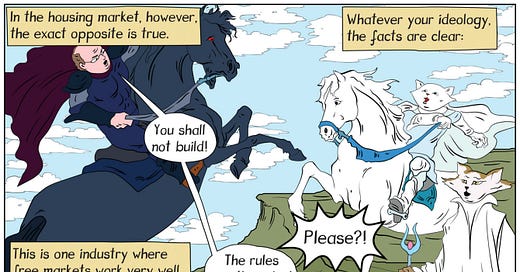
Reflections on the Balan-Caplan Poverty Debate
I really enjoyed my Tuesday debate on “The Philosophy of Poverty?” with my friend David Balan. Many thanks to GMU’s Economics Society for setting it up. While we had a great discussion, here are a few thoughts I’d like to add.
1. In my closing statement, I claimed that we should worry about the accuracy of our moral judgments because (a) moral issues are complex, and (b) human beings throughout history have generally considered their societies to be just no matter how awful they actually were. Rather than retreat to agnosticism, however, I argued that the right reaction is to focus on simple moral hypotheticals. Suppose, for example, we want to decide if “I had a disadvantaged background” significantly reduces moral culpability. The best approach is to imagine a situation where your spouse cheats on you, then pleads, “It’s not my fault, my dad cheated on my mom so I didn’t have a good role model.” Or better yet, imagine you’re advising a friend in this situation. To me, the answer’s pretty clear: Excuses like this carry near-zero moral weight.
2. In his closing statement, David objected that he doesn’t believe in credulously accepting such excuses for bad behavior. As long as David is talking about specific incidents of bad behavior, I believe him. My point, however, is that if his moral theory were true, he should accept such excuses. Since he doesn’t, he should abandon his moral theory.
3. David also insisted that he doesn’t accept his society as just. My point, though, was simply that humans’ judgment about big moral questions is poor, since most people throughout history have accepted their societies as just.
4. David repeatedly referenced the “privilege” of the audience, so this seems like a good time to explain my general views on this matter. He begins with some truisms. Have I had many advantages in life for which I cannot reasonably claim credit? Of course. For example, I was born into an upper-middle class home in Los Angeles, not a slum in Tijuana. But David, like most people who appeal to “privilege,” seems to see important implications. I struggle to figure out what these implications are supposed to be. Some possibilities:
a. My background partially clouds my judgment due to self-serving bias. True enough, but the same holds for everyone, including the very least “privileged” people. Furthermore, since almost no one who shares my background shares my views, it’s hard to see how my background could cause my views. Indeed, some of my main views – most obviously, the wastefulness of education – are precisely the opposite of what you’d expect from a tenured professor with self-serving bias.
b. Much of my success is unearned, so I shouldn’t resist too hard when politicians propose redistribution. But this runs afoul of simple moral hypotheticals. E.g., if your friend stole $100 from your wallet, would you consider, “Unlike you, I came from a poor family,” to be a morally plausibly excuse?
c. Much of my success is unearned, so I shouldn’t feel too proud of my accomplishments. Well, I would definitely feel even prouder if I grew up homeless in Haiti. But that hardly shows that I’m wrong to feel very proud indeed.
d. I should avoid hurting the feelings of people who have had a harder life than mine. A reasonable point, but it’s only a special case of a more general – and widely shared – principle: Avoid hurting people’s feelings. However, this comes with a complementary principle: Avoid taking offense when none is intended. From what I’ve seen, most people who talk about “privilege” routinely and grossly violate this latter principle.
Perhaps I’ve missed something, but I doubt it. What’s really going on, I fear, is that “privilege” is a morally vacuous concept people deploy to demoralize and dehumanize people who disagree with them.
5. David repeatedly said that I overestimated the extent of “predatory” behavior among the poor. The main thing on my mind, however, is not calculated wrong-doing, but impulsivity. For example, I doubt many alcoholics ever consciously planned to destroy their families for beverages. Instead, I think they just fail to control their impulsive thirst – even when they know that acting on this thirst has dire consequences. Still, that’s more than enough to merit Puritanical condemnation. The same goes for the full range of irresponsible behavior: unprotected sex, laziness, child neglect, infidelity, violence, and so on.
6. David was incredulous when I suggested that we could significantly alleviate child poverty by holding irresponsible parents more financially accountable. So let me offer this modest proposal: When a child receives government assistance, we should deduct the cost from his parents’ future Social Security benefits. If one parent fails to provide child support, we should deduct the cost from his Social Security benefits alone; otherwise, the parents split the cost. Administratively, this seems quite manageable. Of course, this modest proposal means that many deadbeat dads will have to endure late retirement, but that seems a lot fairer than burdening taxpayers.
P.S. As usual, I’m happy to let David respond.
The post appeared first on Econlib.











